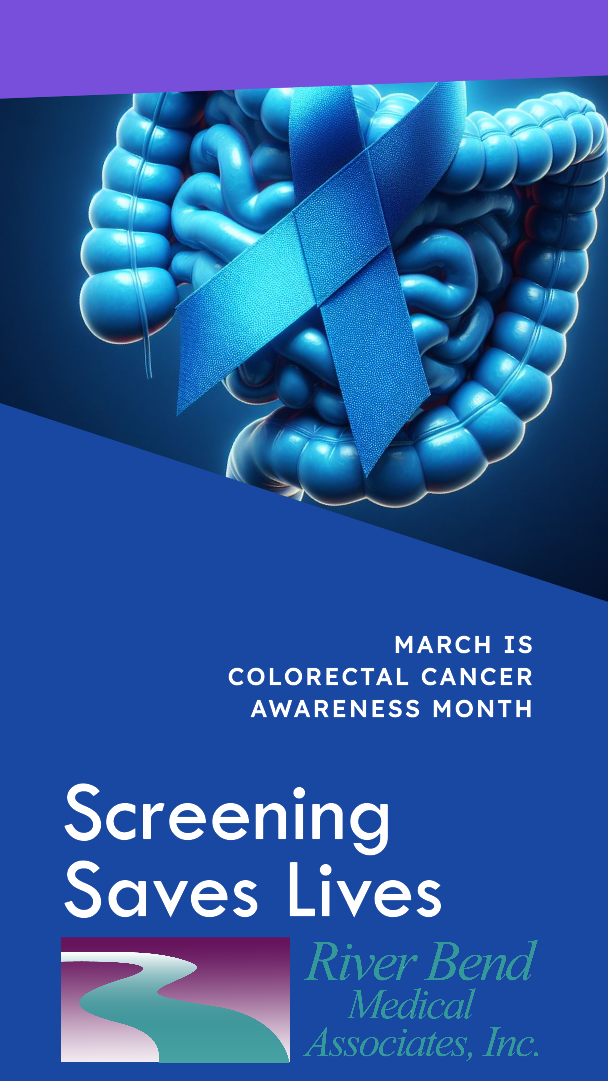March is Colorectal Cancer Awareness Month, a time dedicated to raising awareness about colorectal cancer (colon cancer). This type of cancer affects the colon and rectum, which are parts of your digestive system. While often overshadowed by other cancers, colorectal cancer (CRC) is a serious public health concern. Since CRC is often preventable through early detection and healthy lifestyle choices, we want to empower you with information and encourage you to take steps to protect your health.
Colorectal Cancer on the Rise, Especially Among Young Adults
Colon cancer and CRC are currently the second leading cause of cancer death worldwide, but it might become the number one cause for people under 50 by 2030. Doctors are seeing a sharp increase in cases of early-onset colon cancer, diagnosed before age 50. This number is expected to skyrocket by over 140% in the next six years, with over 27,000 young adults in the United States potentially receiving a colon cancer diagnosis in 2030. These disturbing estimates show that we all need to take action now to address this growing problem among younger people.
National Colorectal Cancer Statistics are a Cause for Concern
In the United States, the risk of colon cancer (CRC) is significant, with roughly 1 out of 23 men and 1 out of 26 women receiving a diagnosis in their lifetime. This year alone, the American Cancer Society estimates that over 152,000 new cases of colon cancer will be found, and over 53,000 people will die from it. These numbers show us how common and serious colon cancer can be.
Beyond the Numbers: Unequal Burdens and the Need for Inclusivity in CRC Awareness
The national statistics only offer a general overview. Colorectal cancer affects certain groups of people more than others. People with a family history of the disease, the LGBTQ+ community, and people with socioeconomic status face a higher risk. It’s important to raise awareness and make sure everyone has equal access to early detection and other preventive measures.
For example, Black Americans are 20% more likely to be diagnosed with CRC and 40% more likely to die from it compared to other groups. Similarly, CRC is the third most common cancer among Alaska Native people, especially younger individuals. Additionally, the LGBTQ+ community generally has lower screening rates, necessitating targeted outreach and increased education efforts to bridge this gap.
Symptoms of Colon Cancer or CRC
While there may be no symptoms in the early stages, some common signs of colorectal cancer can include:
- A change in bowel habits, such as diarrhea, constipation
- Narrower stools than usual, lasting for more than a few days
- Feeling like you haven’t completely emptied your bowels
- Blood in your stool (bright red, dark brown or black).
- Frequent abdominal pain, cramps, or bloating.
- Unexplained weight loss.
- Feeling very tired (weakness and fatigue).
If you experience any of these symptoms, it is important to see your doctor right away.
CRC Screening & Early Detection – Your Best Defense

Looking at the bright side, colorectal cancer is highly preventable with early detection. Colon cancer screening is the most effective way to catch the disease early, and that is when it is most treatable. Starting at age 45, you should talk to your doctors about screening options like colonoscopies or stool tests. Early detection significantly improves the chances of successful treatment and reduces the risk of death from CRC.
Contact River Bend Medical Associates for a screening if you are over 45 or have concerning symptoms
916-392-4000
Test Your Colon Cancer Knowledge
Want to learn more about preventing colon cancer and see how much you already know? Take the CDC’s quick, self-administered quiz.
Take Action Now– Start Talking, Spread Awareness, and Get Screened
Understanding the facts about colorectal cancer and its impact on our diverse communities is crucial for raising awareness and encouraging early detection. This March, take action by:
- Talking to your family and friends about the importance of CRC screening, especially those at higher risk.
- Sharing informative resources on social media or within your community to educate others about the signs and symptoms of CRC.
- Scheduling a screening appointment with your doctor if you are 45 or older, or if you experience any concerning symptoms. If you are any age, talk with your doctor and ask questions.
Colorectal Cancer is preventable. This March, let’s work together to raise awareness, address existing disparities, and empower individuals to take charge of their health through early detection. By promoting knowledge and encouraging action, we can make strides towards defeating colorectal cancer and saving lives.
Additional Resources:


